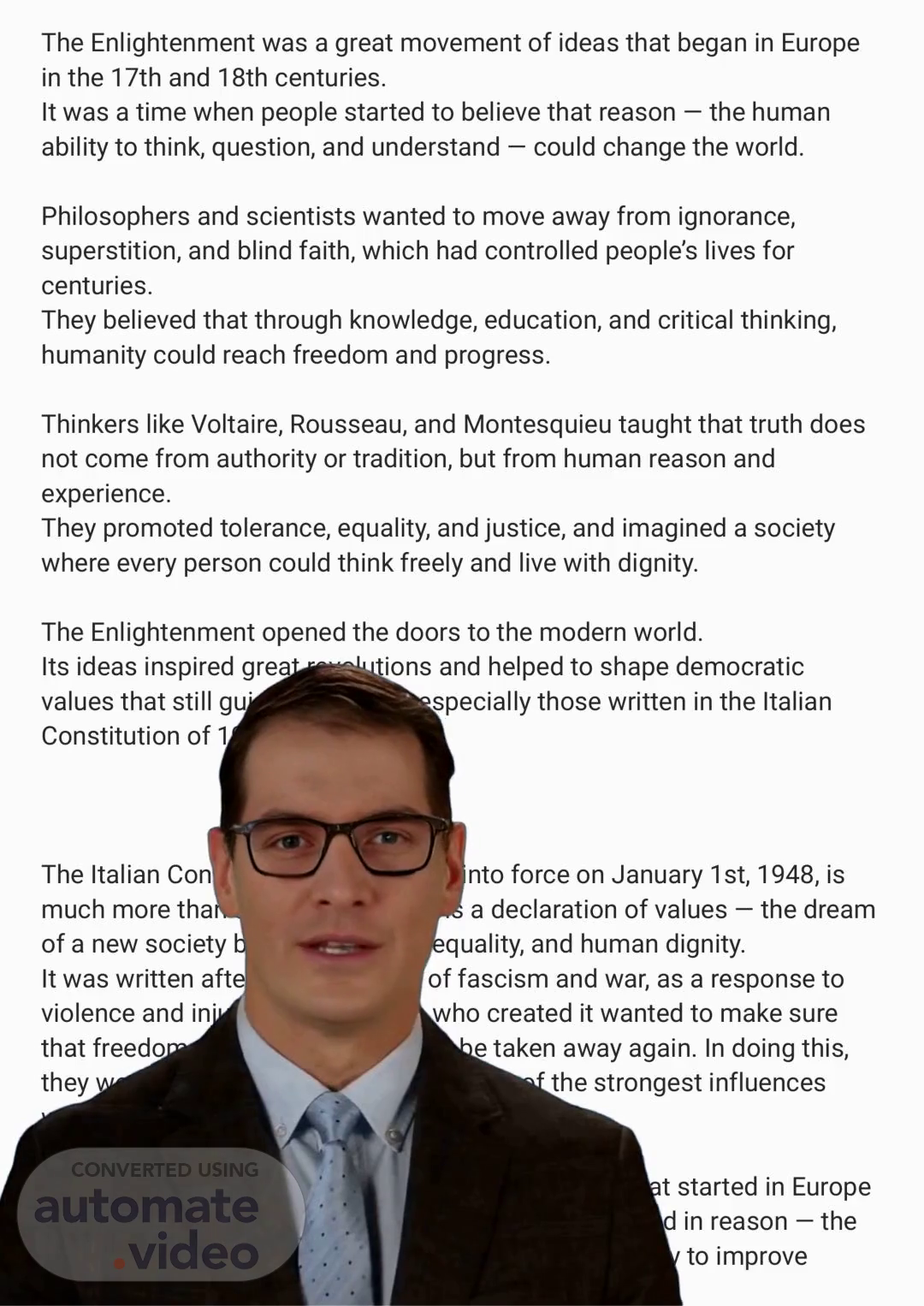Scene 1 (0s)
[Virtual Presenter] The Enlightenment was a major intellectual movement that took place in Europe during the 17th and 18th centuries. During this period, people began to believe that reason could have a significant impact on the world. Philosophers and scientists sought to move away from ignorance, superstition, and blind faith, which had dominated people's lives for centuries. They believed that through knowledge, education, and critical thinking, humans could achieve freedom and progress. Key thinkers such as Voltaire, Rousseau, and Montesquieu emphasized that truth does not come from authority or tradition, but rather from human reason and experience. They advocated for tolerance, equality, and justice, and envisioned a society where individuals could think freely and live with dignity. The Enlightenment laid the groundwork for the modern world. Its ideas inspired numerous revolutions and shaped democratic values that continue to influence our society today. The Italian Constitution, which went into effect on January 1st, 1948, reflects these ideals. This constitution is more than just a set of laws; it is a statement of values that envisions a society built on freedom, equality, and human dignity. Written in response to the atrocities of fascism and war, the constitution aimed to ensure that freedom and rights would never be taken away again. The creation of the constitution was influenced by various ideas, but one of the most significant was the Enlightenment..
Scene 2 (1m 35s)
[Audio] The ideas of the Enlightenment have had a profound impact on the development of modern democracy. The concept of human rights, equality, and popular sovereignty are fundamental principles that underpin the Italian Constitution. The Constitution recognizes and protects the inviolable rights of every person, both as an individual and as part of social groups, and ensures that freedom is not only a personal right but also a responsibility towards others. Equality is a core value of the Enlightenment, and the Constitution strengthens this idea by removing economic and social obstacles that limit freedom and equality. The concept of popular sovereignty, where power resides with the people, is also a key aspect of the Constitution. Overall, the Italian Constitution embodies the spirit of the Enlightenment, adapting its principles to the needs of a modern democracy..
Scene 3 (2m 32s)
[Audio] The protection of people's freedom is a fundamental aspect of the Italian Constitution, which is deeply rooted in the Enlightenment ideals of political liberty. According to Article 13, personal freedom is guaranteed, while Article 19 safeguards freedom of religion. Furthermore, Article 21 ensures the right to express thoughts freely through various means. These provisions embody the Enlightenment dream of a free human being, transforming it into reality. Additionally, the Constitution acknowledges the importance of property as part of personal freedom, recognizing its social function in Article 42. This concept balances economic freedom with social justice, reflecting the Enlightenment's emphasis on balancing individual rights with the greater good. The separation of powers, inspired by Montesquieu, is also a key feature of the Italian Constitution, ensuring a rational and legal government. The system of checks and balances among the Parliament, Government, Judiciary, Constitutional Court, and President of the Republic protects citizens' rights and defends the balance between powers..
Scene 4 (3m 47s)
[Audio] The Italian Constitution builds upon the Enlightenment ideals of liberty, equality, reason, and human dignity by incorporating additional principles such as solidarity, social justice, and responsibility. These elements work together to create a society that values respect, participation, and human dignity. The Constitution ensures that education is accessible to everyone, guaranteeing freedom of teaching and the right to education. By doing so, it promotes informed citizens who can participate in democracy and defend their freedoms. The connection between the Enlightenment and the Italian Constitution is profound, reflecting the shared values of protecting individual rights and promoting social justice. The Constitution's emphasis on education as a fundamental right underscores its commitment to creating a more enlightened and equitable society..
